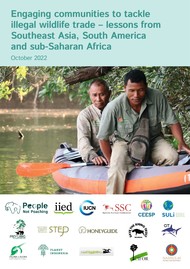Community-led approaches to tackling illegal wildlife trade. Case studies from Latin America

This compilation of case studies has been published in advance of the First Regional Conference on the Illegal Trade in Wildlife in Latin America held in Lima, Peru, on 3 and 4 October 2019. It highlights evidence from 15 countries across Latin America including Colombia, Peru, Mexico, Honduras, Guyana and Ecuador to name a few. The scale of illegal wildlife trade (IWT) internationally is a conservation crisis and tackling it is seen as a race against time. As a quarter of the world’s land is owned or managed by communities, they must be central to conservation efforts – and community engagement is already internationally recognised as important to the global effort to tackle IWT. But because community engagement strategies are complex and take time to implement, not enough initiatives are being supported. This compilation of case studies seeks to address this problem.
The case studies show that there are plenty of examples of successful approaches to engaging communities in tackling illegal wildlife trade, and that there is a need for these to be scaled up and scaled out, learning from experience and adapting approaches to fit specific contexts and meet specific challenges. But the core principles remain the same: a quarter of the world’s land is owned or managed by communities, and they need to be central not peripheral to conservation efforts.
PDF updated in January 2020.
Cite this publication
Available at https://www.iied.org/17656iied






